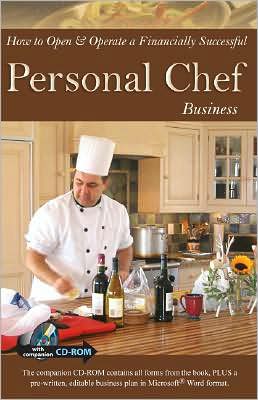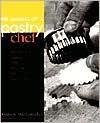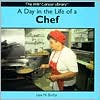Chef Manager
This book gives new chefs in the modern hospitality industry the opportunity to learn detailed management and human relation skills necessary for competitive markets and diverse workplaces. It examines the role of chef as kitchen manager, team coach, and culinary innovator, while employing real work applications. Written on an easy-to-read level, with true-life culinary examples and applications of management theory, this book helps to redefine the role of chef as manager and businessperson....
Search in google:
This book gives new chefs in the modern hospitality industry the opportunity to learn detailed management and human relation skills necessary for competitive markets and diverse workplaces. It examines the role of chef as kitchen manager, team coach, and culinary innovator, while employing real work applications. Written on an easy-to-read level, with true-life culinary examples and applications of management theory, this book helps to redefine the role of chef as manager and businessperson.Chapter topics include the changing role of chef; new values in hospitality; the structure of kitchen organization; implementing TQM; personal management; the chef supervisor; managing diversity; the chef leader; defining leadership; team building; personal development; concept engineering; establishing operational standards; menu management; production management; the business of quality food service; and the future of information technologies.For chefs who are also managers–or considering expanding their culinary portfolios to include the people skills and management tools that Chef Manager puts on the proverbial table. Booknews Examines the managerial responsibilities of the modern executive chef and applies business management, human resource management, and quality management practices to food service hospitality. Concepts of Total Quality Management, such as strategic planning, quality control, concept engineering, and the controlled use of creativity and innovation, are explored from the professional chef's perspective. Chapters cover kitchen organization, personnel management, diversity, communication, team building, menu management, and the future of information technologies. Annotation c. Book News, Inc., Portland, OR (booknews.com)
PREFACE: \ Preface\ The modern hospitality industry demands more of its chefs than ever before. Competitive markets and diverse workplaces have forced chefs to balance culinary artistry with business management and human relations skills. The role of chef has evolved. It is time that the education of young culinarians reflects the changes in the industry, and that working chefs are given the opportunity to learn management and human relations skills from those who have both industry experience and classroom knowledge.\ The Chef Manager examines the role of the chef as kitchen manager, team coach, and culinary innovator. While a complicated study, The Chef Manager reflects practical experience and real life situations. Modern theories of management and human relations skills are explored in detail and given a hospitality twist that can be easily digested by culinary students and working chefs. Students can then practice their new knowledge in their workplaces and witness firsthand the transition of their kitchens and dining rooms from food factories to efficient, quality-inspired operations.\ The Chef Manager also explores the concepts of Total Quality Management (TQM), a theory of management that helped revolutionize the industries of post-World War II Japan and made Japan a leader in the world's economy. TQM strategies now influence many American industries as they, too, try to improve efficiency and increase productivity with an emphasis on quality. A management theory founded by Edward Deming, with contributions from Philip Crosby and Joseph Juran, TQM promotes quality improvements through continual assessments of theefficiency of production and service processes.\ For the hospitality industry, TQM reaffirms the customer's role as the ultimate inspector of quality in product, service, and value. TQM asks for input from all levels of employees and prescribes a teamwork approach to quality improvement. Management is asked to put aside quotas and incentives, and to focus their energies on developing and maintaining a quality workplace.\ The team concept is a natural outcome of TQM implementation. Chefs take on the role of coach and use motivation and inspiration as tools of their new trade. The emphasis is placed on recruiting, training, and keeping quality employees. Everyone has an important role to play, and each contributes to the success of the operation.\ There are many books that address culinary production and artistry, and many on cooking techniques and innovations. The Chef Manager helps pioneer a new study in the role of chef as manager and business person. The chef as manager has become the newest and most dramatic trend to affect the culinary profession since the invention of steel cooking pans and utensils. All professional chefs need to expand their culinary portfolios to include the people skills and management tools that The Chef Manager puts on the proverbial table.\ ACKNOWLEDGEMENTS\ The Chef Manager would not have been possible without the help and inspiration of many. My personal thanks and gratitude to my wife, Elaine Baskette, for her patience and understanding through the enormous process of research and writing. Together we sacrificed many weekends and evenings to see the project come to fruition. A special thank you goes to Neil Marquardt, Marion Gottlieb, and the people at Prentice Hall who were first inspired by the prospect of a book on kitchen management.\ My professional gratitude goes to Chef Jim Morris, CCE; Chef Thomas Macrina, CEC; Chef Dan D'Angelo, CEC; and Chef Nancy Longo, who each contributed their own inspiring stories to the text. They are consummate professionals who are always ready to help a fellow chef or culinary student in the quest for success in this exasperating industry.\ I would like to thank John D. Britto, San Joaquin Delta College; and Stephen E. Carlomusto, Johnson and Wales University for reviewing the manuscript.\ I also want to give special recognition to the efforts of Barbara Kuck and her staff at the Culinary Archives and Museum at Johnson & Wales University, who go out of their way to preserve and promote our rich culinary heritage. It was through their efforts that the photos of the world's great chefs became available for reproduction in The Chef Manager.
Ch. 1The changing role of chef3Ch. 2New values in culinary leadership36Ch. 3The structure of kitchen organization63Ch. 4Foundations in quality79Ch. 5W. Edwards Deming's fourteen quality points90Ch. 6Joseph Juran's trilogy and the Pareto principle106Ch. 7Discovering Philip Crosby's zero defects117Ch. 8Kaoru Ishikawa and Armand Feigenbaum126Ch. 9Implementing quality management programs137Ch. 10Personnel management151Ch. 11The chef supervisor171Ch. 12Communication176Ch. 13Managing diversity190Ch. 14Defining leadership201Ch. 15Team building208Ch. 16Personal development217Ch. 17Managing the modern workplace233Ch. 18Concept engineering242Ch. 19Establishing operational standards253Ch. 20Menu management264Ch. 21Production management275Ch. 22A place for creativity283Ch. 23The business of quality food service291Ch. 24The future of information technologies301
\ BooknewsExamines the managerial responsibilities of the modern executive chef and applies business management, human resource management, and quality management practices to food service hospitality. Concepts of Total Quality Management, such as strategic planning, quality control, concept engineering, and the controlled use of creativity and innovation, are explored from the professional chef's perspective. Chapters cover kitchen organization, personnel management, diversity, communication, team building, menu management, and the future of information technologies. Annotation c. Book News, Inc., Portland, OR (booknews.com)\ \








